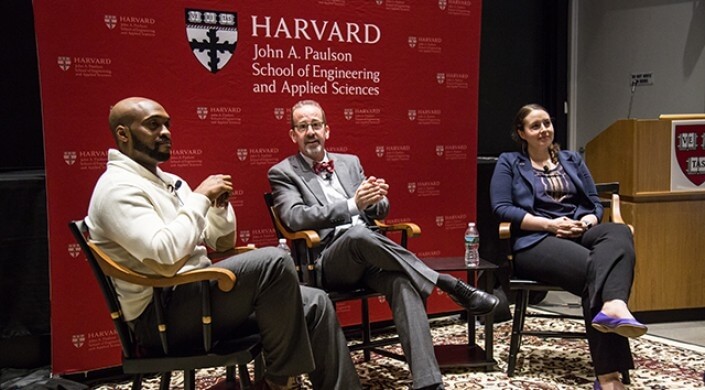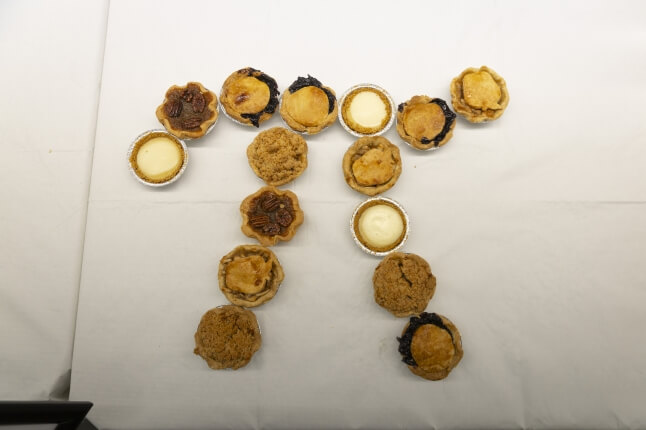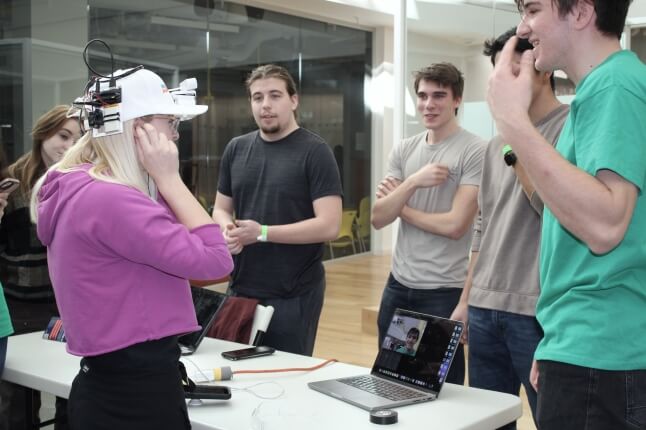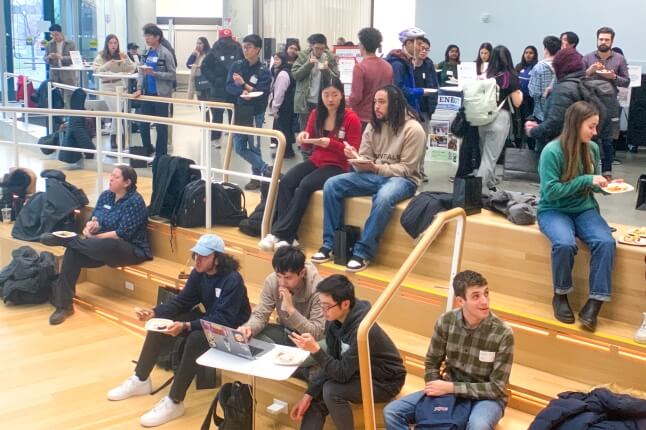News
During the third annual Sophomore Convocation, Dean Frank Doyle (center) moderated a panel discussion with SEAS alumni Jeff Allen, S.B. '06 (mechanical engineering) and Jessica Yeager, S.B. '08 (environmental science and engineering.) (Photo by Annie Schugart/SEAS Communications)
New concentrators in engineering, applied math, and computer science were welcomed into the fold during the Harvard John A. Paulson School of Engineering and Applied Sciences third annual Sophomore Convocation on Feb. 12.
Dean Frank Doyle greeted the sophomores, who comprise the largest incoming class in the School’s 11-year history. The 359 incoming concentrators also form the most diverse class—39 percent are women and 21 percent identify as an underrepresented minority.
Doyle emphasized recent strides SEAS has taken to increase diversity, including the launch of a diversity and inclusion task force and a school-wide climate survey.
“Diversity has been one of the top priorities of my deanship,” said Doyle, who came to Harvard in 2015. “We are working to understand and address diversity, inclusion, and belonging through recruiting and building community, so that everyone feels welcome.”
Doyle also highlighted the future home for much of the SEAS community—Harvard’s new Science and Engineering Complex in Allston—which will open its doors in the fall of 2020. This year’s sophomores will take classes in the state-of-the-art building during their senior year. Much of its more than 500,000 square feet will be devoted to students, Doyle said, with active learning labs, makerspaces, and garages for student clubs that build cars, drones, or other mechanical apparatus.
Following Doyle’s remarks, three upperclassmen, computer science concentrator Ryan Lee, A.B. ’20, applied math concentrator Manny Medrano, A.B. ’19, and biomedical engineering concentrator McKenna Roberts, A.B. ’19, each presented a one-minute “lightning talk” summarizing their most poignant experiences at SEAS.
Roberts, as a team lead for the school’s chapter of Engineers Without Borders USA, had the opportunity to travel to a village in the Dominican Republic to design and install a water distribution system.
“The teamwork skills that you learn at midnight when you are really stressed out and trying to work on a p-set with your friends, those are the skills that you need on day 16 of a construction trip when you are mentally and physically exhausted,” she said. “SEAS allows you to take teamwork skills and technical skills and really put them into practice in the real world.”
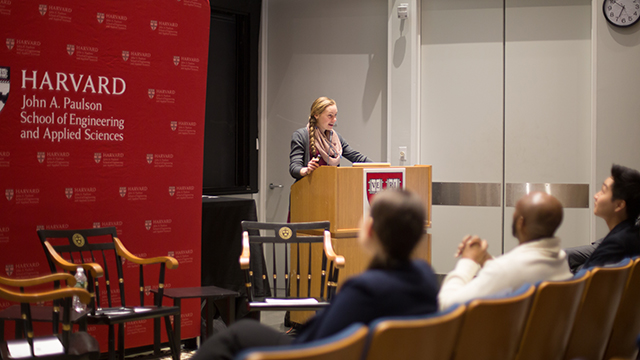
Biomedical engineering concentrator McKenna Roberts, A.B. ’19 gives a one-minute lightning talk to the crowd of recently-declared SEAS students. She spoke about how her time at SEAS has allowed her to "solve problems with people for people." (Photo by Annie Schugart/SEAS Communications)
The challenges of making the leap from Harvard into the real world were emphasized by two alumni panelists who offered advice to the budding engineers and applied scientists. Environmental science and engineering concentrator Jessica Yeager, S.B. ’08, and mechanical engineering concentrator Jeffrey Allen, S.B. ’06, shared nuggets of wisdom from their academic journeys and career paths.
Yeager, senior engineer at Geosyntec Consultants, underscored the collaboration techniques and presentation skills she developed during Engineering Problem Solving and Design Project (ES 96), which challenges a student team to develop an engineering solution to a problem faced by a real-world client.
“There are very few engineering careers where you are totally alone,” she said. “Often, you are working with other people—your client, coworkers, stakeholders. It was great to learn about teamwork in undergrad and really get a chance to develop those skills.”
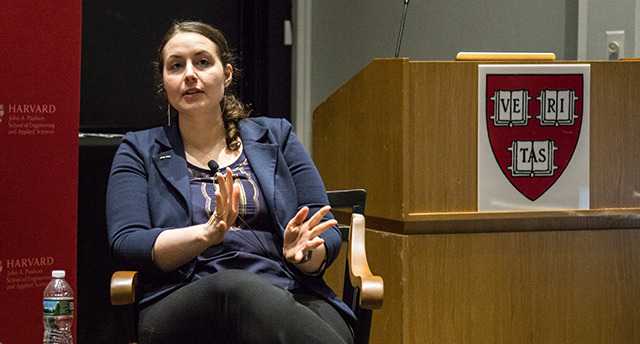
Alumna Jessica Yeager, S.B. '08 (environmental science and engineering), emphasizes the importance of collaboration to new SEAS concentrators. (Photo by Annie Schugart/SEAS Communications)
For Allen, juggling a demanding mechanical engineering course load while playing on the varsity Crimson football team forced him to learn time management skills that have proven vital in his role as Gillette global program manager at Procter and Gamble.
But even with all the skills a Harvard engineering education provides, students will still face setbacks, Allen said. For instance, his work launching P&G’s Tide Pods business involved 80-hour workweeks as he put out fire after fire that threatened the entire project. The resilience he built at Harvard pushed him to succeed.
“Be fearless. Recognize that you only fail when you fail to learn,” he said. “Setbacks are just opportunities to figure out what I need to tweak and what I need to do better to be successful.”
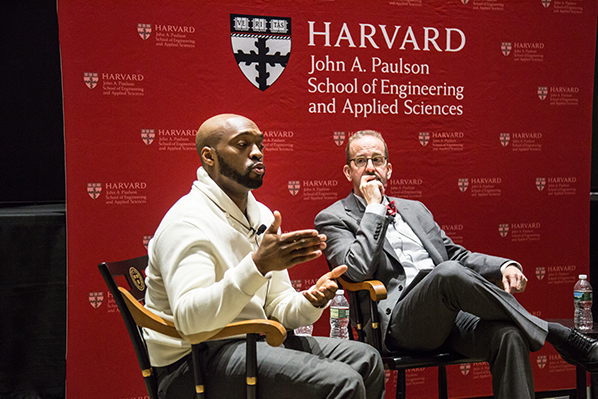
Alumnus Jeffrey Allen, S.B. '06 (mechanical engineering), discusses how his experiences balancing courses and extracurricular activities helped him learn vital time management skills. (Photo by Annie Schugart/SEAS Communications)
Allen’s advice resonated with Robert Malate, S.B. ’21, a mechanical engineering concentrator who chose the field of study because he loves designing aircraft and robotics.
“Just keep pushing. Concentrating in engineering or any SEAS concentration is going to be difficult,” he said. “Allen’s words are so true. There are nights when you are going to have to pull an all-nighter or when you are going to have to work hard, but in the end it teaches you that working hard is not a bad thing and you can look back and say, ‘hey, I’ve done harder things before.’”
Electrical engineering concentrator Dani Davis, S.B. ’21, was glad the presenters raised the importance of emotional intelligence, which can easily be overlooked by engineers who are focused on results. She looks forward to honing both technical expertise and soft skills as she delves deeper into engineering coursework.
“I’m excited about SEAS because it teaches you how to solve problems; not just problems in a mathematical sense, but problems in the real world,” she said. “It teaches you how to think, to actually impact change, and that is something that is really cool to me.”
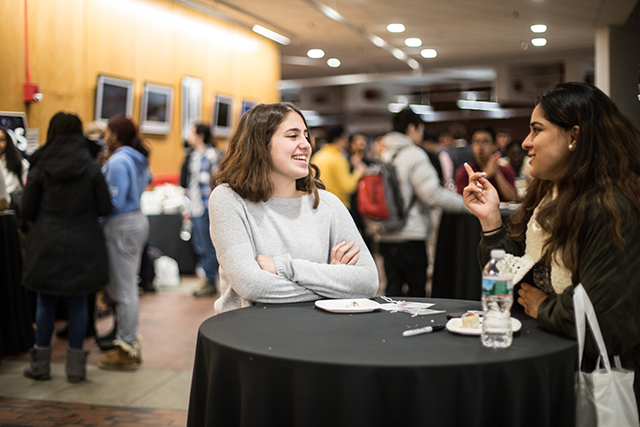
Students mingle as they learn about some of the many SEAS student organizations during a reception following Sophomore Convocation. (Photo by Annie Schugart/SEAS Communications)
Topics: Diversity / Inclusion, Events
Cutting-edge science delivered direct to your inbox.
Join the Harvard SEAS mailing list.
Press Contact
Adam Zewe | 617-496-5878 | azewe@seas.harvard.edu
